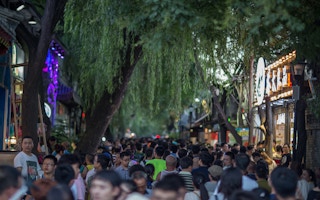Imagine a president of the United States calling for an “ecological civilisation” that ensures “harmony between human and nature.”
Now imagine he goes on to declare that “we, as human beings, must respect nature, follow its ways and protect it” and that his administration will “encourage simple, moderate, green and low-carbon ways of life, and oppose extravagance and excessive consumption.”
Dream on, you might say. Even in the more progressive Western European nations, it’s hard to find a political leader who would make such statements.
And yet, the leader of the world’s second largest economy, Xi Jinping of China, made these statements and more in his address to the National Congress of the Communist Party last October. He went on to detail plans to facilitate “green, low-carbon and circular development,” “promote afforestation,” “strengthen wetland conservation and restoration,” and “stop and punish all activities that damage the environment”—in short, “to build an ecological civilisation that will benefit generations to come.”
It’s easy to dismiss it all as mere political rhetoric. But could it be that Xi’s ecological vision offers a glimpse of a hopeful future?
Transformative vision
In fact, this is just the type of fresh thinking that many environmentalists have been calling for. And this hasn’t been lost on some leading thinkers.
David Korten, a world-renowned author and activist, has proposed expanding the vision of Ecological Civilisation to a global context, including granting legal rights to nature, shifting ownership of productive assets from transnational corporations to nation-states and self-governing communities, and prioritising life-affirming, rather than wealth-affirming, values.
As I’ve traced in my book, The Patterning Instinct: A Cultural History of Humanity’s Search for Meaning, traditional Chinese culture was founded on a worldview that perceived an intrinsic web of connection between humanity and nature, in contrast to the European worldview that saw humans as essentially separate from nature. Early Chinese philosophers believed the purpose of life was to seek harmony, while Europeans pursued a path based on a different set of values—which have since become global in scope—driven by “conquering nature” and viewing nature as a machine to be engineered.
Xi’s rhetoric seems to be grounded in at least some reality. Two months before his speech, China announced it was more than doubling its previous solar power target for 2020, after installing more than twice as much solar capacity as any other country in 2016. It is similarly on track to exceed its wind power targets, and will soon boast more capacity than all of Europe.
“
Is it possible that China can use this profound recognition of human interconnectedness, rooted deeply in its cultural tradition, to break the death-grip of a global system built on continually feeding the growth frenzy of gigantic transnational corporations?
As a result, China recently at least temporarily stopped progress on plans for building more than 150 coal-fired power plants. In electric cars, China is leading the world, selling more each month than Europe and the US combined, with more aggressive quotas on gas-guzzlers than California. Additionally, China has the world’s most extensive network of high-speed trains, and supports the concept of a circular economy where waste products from industrial processes are recycled into inputs for other processes.
Industrial avalanche
Some observers, however, are far from convinced that China is on its way to an ecological civilisation.
For one thing, the human-rights abuses of its authoritarian government seem inconsistent with the concept of an ecological civilisation. For China to genuinely move in this direction, Xi would need to be prepared to devolve decision-making authority and freedoms back to the people. It’s a tall order, and recent constitutional changes permitting Xi to remain in power for life give further cause for concern.
For another, as economist Richard Smith argues, China’s political-economic system is based on the need to maximise economic growth, employment and consumerism to an even greater extent than in the West. China’s GDP is expected to surpass that of the US within a decade. The country is in the early stages of a profusion of record-breaking industrial megaprojects of a scale that boggles the mind, including its Belt and Road Initiative, a vast infrastructure and trading project encompassing more than 60 countries in Europe, Asia and Africa.
This industrial avalanche comes at great cost to China’s—and the world’s—environmental well-being. Smith notes that China is by far the world’s largest fossil fuel consumer. It is also the world’s largest importer of lumber. These are just some of the forces that draw Smith to conclude that “Xi Jinping can create an ecological civilisation, or he can build a rich superpower. He can’t do both.”
Between Heaven and Earth
Or can he?
There is urgent awareness that continued growth in global GDP is leading civilisation to the point of collapse. Movements are emerging that call for “degrowth” and other approaches to a steady-state economy.
While future economic growth at anything close to China’s historic rate is untenable, what if, once China regains its status as a leading world power, it redirects its vitality from continued consumerism into growing a life of quality for its people? Could it be that Xi Jinping is sowing the seeds of this future metamorphosis with his vision of an ecological civilisation?
A thousand years ago, Chinese philosopher Zhang Zai expressed a realisation of connectedness with the universe in an essay that begins with these words:
Heaven is my father and Earth is my mother, and I, a small child, find myself placed intimately between them.
What fills the universe I regard as my body; what directs the universe I regard as my nature.
All people are my brothers and sisters; all things are my companions.
Is it possible that China can use this profound recognition of human interconnectedness, rooted deeply in its cultural tradition, to break the death-grip of a global system built on continually feeding the growth frenzy of gigantic transnational corporations? Could it pioneer a new ethic of sustainability as the philosophical basis for a true ecological civilisation? The answer to these questions may ultimately affect the future well-being, not just of China, but of the entire human family.
Jeremy Lent is author of The Patterning Instinct: A Cultural History of Humanity’s Search for Meaning, which investigates how different cultures have made sense of the universe and how their underlying values have changed the course of history. This post is republished from Ensia with permission.









